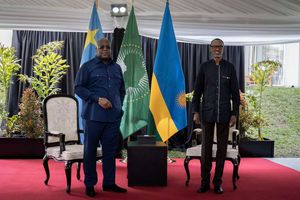How Tanzania will execute connectivity, smart cities plans

Dar es Salaam is the Tanzania's largest city and commercial. PHOTO | iStock
What you need to know:
- About 44 percent of the 2024/2025 expenditure will finance the National ICT Broadband Backbone (NICTBB) expansion, including the construction of a186-kilometre line from Kigoma in Tanzania to DR Congo
Dar es Salaam. Connectivity across Tanzania and neighbouring countries, and digital economy projects such as development of smart cities are some of the focus areas in the Ministry of Information, Communication, and Information Technology budget which was approved by the Parliament on Thursday.
About 44 percent of the 2024/2025 expenditure will finance the National ICT broadband backbone (NICTBB) expansion, including the construction of the 186-kilometer backbone line extending from Kigoma in Tanzania to the Democratic Republic of Congo, according to the Minister for Information, Communication and Information Technology, Mr Nape Nnauye, who presented the estimates in Dodoma on Thursday.
Mr Nnauye proposed the Sh180.92 billion budget which was approved by the Parliament after deliberations. The budget is lower than Sh212.4 billion which was approved in 2023/2024.

Prime Minister Kassim Majaliwa congratulates Information, Communication and IT minister Nape Nnauye and his deputy, Maryprisca Mahundi, after Parliament approved the Information, Communication and IT ministry’s 2024/25 budget proposals in Dodoma on May 16, 2024. PHOTO | EDWIN MJWAHUZI
According to Mr Nnauye, the government will spend Sh80.7 billion on the NICTBB project to extend connectivity.
“In that project, it will also include enabling the establishment of the Broadband Geographical Information System, construction of National Data Storage Centres in Dodoma and Zanzibar, and developing and implementing Last Mile Optic Fibre infrastructure for 100 justice, safety and security institutions,” he said.
“Enabling the installation and improvement of video conference meeting equipment in 100 districts, Installing Wi-Fi access in 50 public areas, conducting feasibility studies for the national digital infrastructure development programme,” said Mr Nnauye.
The ministry also plans to spend a significant sum of its development budget at Sh24.85 billion for the ‘Digital Tanzania Project’ which among other key activities will be facilitating the construction of ICT Colleges in Nala-Dodoma and Buhigwe-Kigoma.
“The government will be completing the installation, establishment, and utilization of the national information statistics system for ICT in the country, as well as conducting feasibility studies for the installation of ‘Smart Cities’ in the cities of Dodoma, Arusha, and Mbeya,” he said.
A total of Sh11.5 billion has been allocated for the postcode project where activities will include the coordination and drafting of the residential address laws and updating the existing ones as well as facilitating the integration of the residential address system with other social service delivery systems.
“We will also complete the verification exercise of residential address information; other tasks include improving the digital residential address system to align with international standards and promote usage and educate the public about the address system,” said Mr Nnauye.
Other development plans for the ministry in the coming year will also include Sh4 billion for the ICT parks across the country, Sh9.3 billion for expanding the broadcasting network of the Tanzania Broadcasting Corporation (TBC), and Sh5 billion for the new publishing machine.
A total of Sh3 billion will be allocated to enhance the capacity of institutions in the execution of their duties, while Sh980 million will be designated for a mass communication project and Sh2.1 billion shillings will be allocated to support the development of innovation and the manufacture of ICT equipment.
After noticing a budget shortfall of nearly 22 percent, the Parliamentary Committee on Infrastructure recommended that the government invest adequate funds in projects within this sector, as investment in these sectors is a significant catalyst for both economic and social development, similar to investments in other services.
The committee chairman, Mr Moshi Kakoso, said, “The Government needs to ensure that this sector thrives and contributes significantly to the economic development of the country.”
The Committee has also advised the government to expedite the process of extending the NICTBB to neighbouring countries, including the Democratic Republic of Congo, to increase the country’s revenue.
The committee has commended the government’s decision to entrust the operation of the project to the Tanzania Telecommunications Corporation (TTCL).
However, they recommended that the government review the contract for the construction to identify the best way to address existing shortcomings and complete the construction on time and efficiently.



